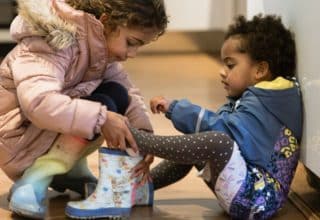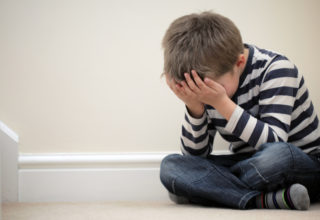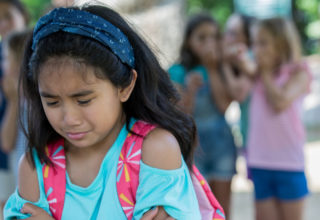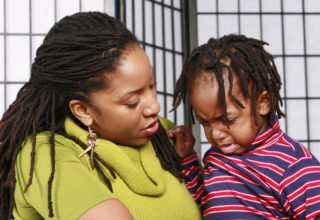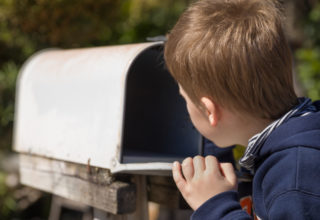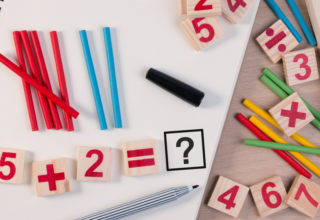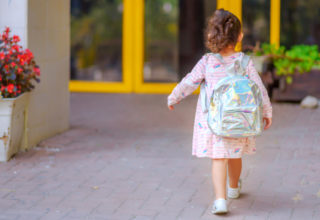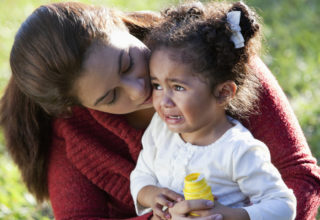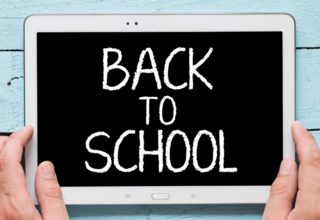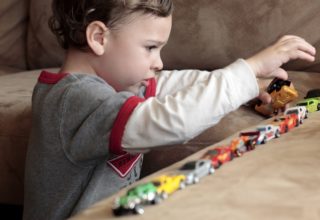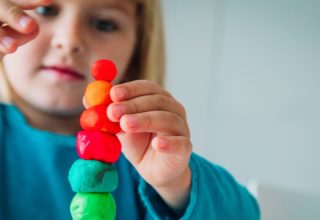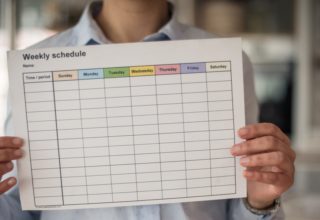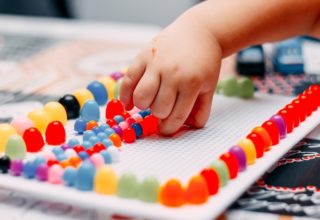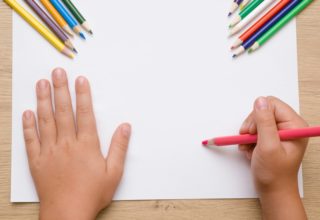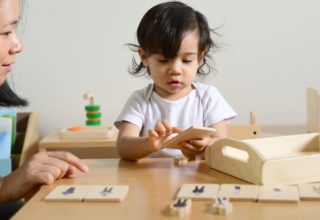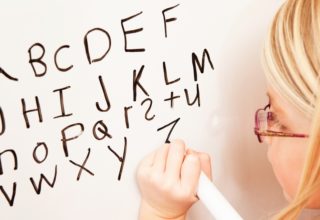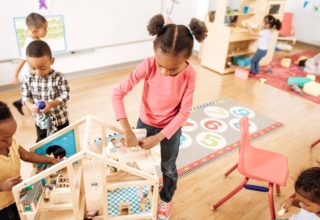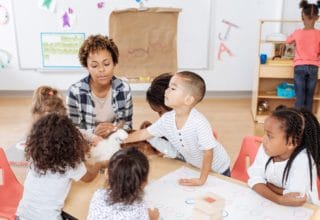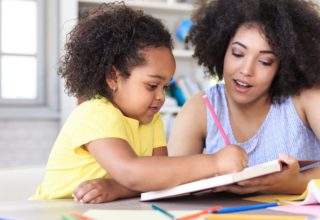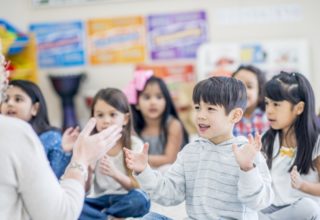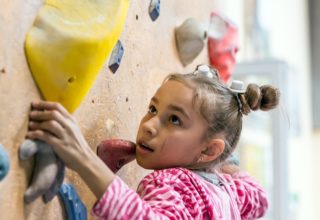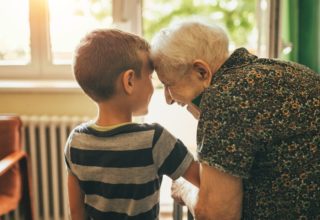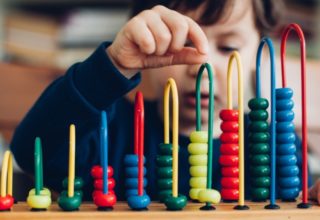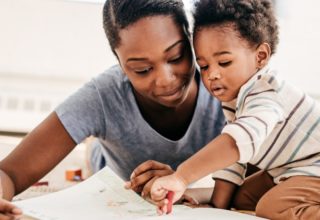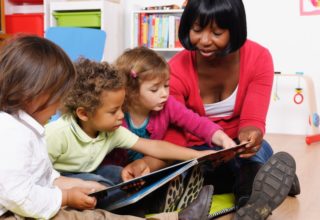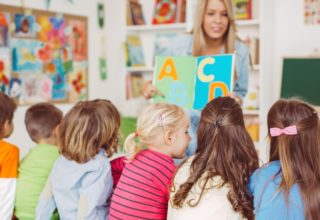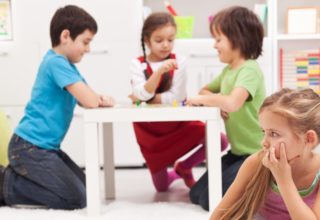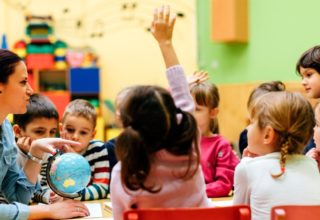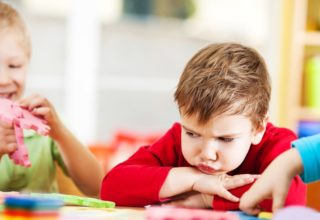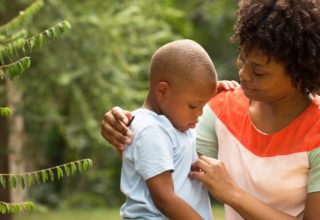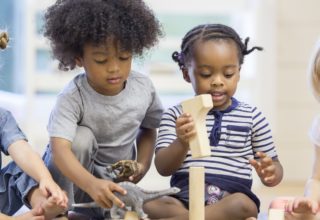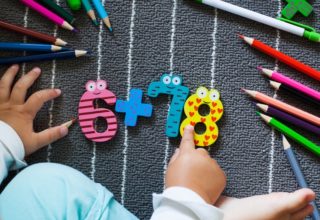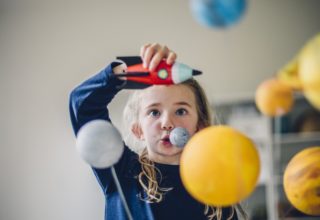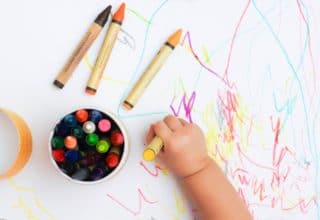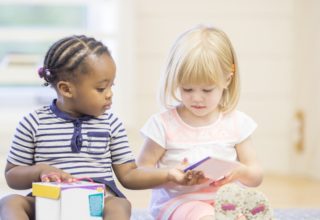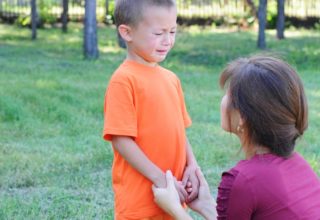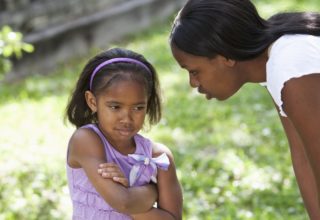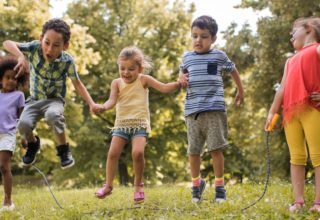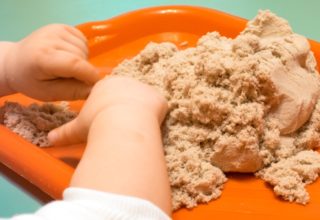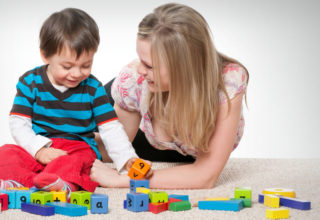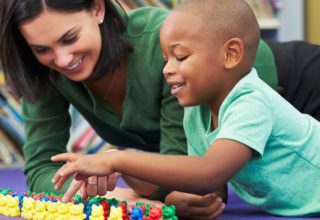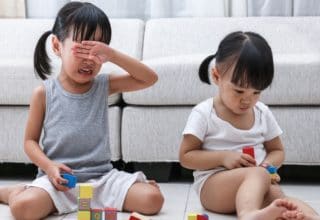Search Results for:
Should parents force siblings to ‘get along’? What do you say when siblings are constantly competing with each other? What...
Should parents force siblings to ‘get along’? What do you say when siblings are constantly competing with each other? What...
Sibling rivalry and fighting are normal parts of family dynamics, but they can really disrupt a home’s harmony and stir...
Sibling rivalry and fighting are normal parts of family dynamics, but they can really disrupt a home’s harmony and stir...
For many children, kindness needs to be explicitly taught. Parents and teachers only need a few prompts to help their...
For many children, kindness needs to be explicitly taught. Parents and teachers only need a few prompts to help their...
Getting to know your child’s imaginary friends is a fun perk of parenting and teaching. Those characters – whether invisible,...
Getting to know your child’s imaginary friends is a fun perk of parenting and teaching. Those characters – whether invisible,...
Make it easier to withstand your child’s behavioral storms – key foundational and behavioral practices you should implement before you...
Make it easier to withstand your child’s behavioral storms – key foundational and behavioral practices you should implement before you...
Learn why maturing children struggle with challenging behavior and how they developmentally need a different approach to discipline.
Learn why maturing children struggle with challenging behavior and how they developmentally need a different approach to discipline.
How to discipline your maturing child when you encounter problematic behavior. Key in-the-moment concepts to practice, including scripts you can...
How to discipline your maturing child when you encounter problematic behavior. Key in-the-moment concepts to practice, including scripts you can...
A simple sequence for what to do (and not to do) when your child lies, and strategies to lay the...
A simple sequence for what to do (and not to do) when your child lies, and strategies to lay the...
A practical roadmap to guide your response when your child lies. Understand the common developmental reasons for why children lie...
A practical roadmap to guide your response when your child lies. Understand the common developmental reasons for why children lie...
When your child begins having anxious thoughts, empower them with practical self-help strategies and coping skills so that they can...
When your child begins having anxious thoughts, empower them with practical self-help strategies and coping skills so that they can...
Learn how to help your child handle the expected feelings related to anxiety, and how to identify when anxiety moves...
Learn how to help your child handle the expected feelings related to anxiety, and how to identify when anxiety moves...
Foundational skills for teaching your child to be more independent and to be in charge of themself and their learning....
Foundational skills for teaching your child to be more independent and to be in charge of themself and their learning....
Concrete steps to help identify why your maturing child may be using disrespectful language or tone of voice and how...
Concrete steps to help identify why your maturing child may be using disrespectful language or tone of voice and how...
Strategies, tools and scripts for teaching your child how to practice being a ‘good’ friend.
Strategies, tools and scripts for teaching your child how to practice being a ‘good’ friend.
Teach your child a strong Friend Skill Set that can help them establish healthy, happy friendships and that will support...
Teach your child a strong Friend Skill Set that can help them establish healthy, happy friendships and that will support...
Is your child able and ready to say/do the upstanding thing? Help your child know what to say in-the-moment when...
Is your child able and ready to say/do the upstanding thing? Help your child know what to say in-the-moment when...
Core concepts your child should know when being an upstander and how to practice them at home among daily routines.
Core concepts your child should know when being an upstander and how to practice them at home among daily routines.
The importance of being an upstander and the skills a child should learn to stand up and speak up for...
The importance of being an upstander and the skills a child should learn to stand up and speak up for...
Answers to common questions about handling a child’s angry behaviors. From, “How do I know what is normal?” to “My...
Answers to common questions about handling a child’s angry behaviors. From, “How do I know what is normal?” to “My...
Key strategies and tools to use before, during and after your child’s angry outbursts – all in a simple printable...
Key strategies and tools to use before, during and after your child’s angry outbursts – all in a simple printable...
Identify what anger looks like across different developmental ages and understand what is a typical anger expression and what is...
Identify what anger looks like across different developmental ages and understand what is a typical anger expression and what is...
Discover how your child’s brain and body are emotionally and physically processing their anger, and strategies and tools to help...
Discover how your child’s brain and body are emotionally and physically processing their anger, and strategies and tools to help...
The benefits of letting your child be bored and five ways to teach your child how to move through boredom....
The benefits of letting your child be bored and five ways to teach your child how to move through boredom....
Learn why patience is a learned skill and essential for character and academic development, and seven key strategies to teach...
Learn why patience is a learned skill and essential for character and academic development, and seven key strategies to teach...
Learn specific tips from a teacher on how to read aloud to your child, listen to your child read aloud...
Learn specific tips from a teacher on how to read aloud to your child, listen to your child read aloud...
Reading aloud is important even for older children and proficient readers. Discover the benefits of reading aloud to your child,...
Reading aloud is important even for older children and proficient readers. Discover the benefits of reading aloud to your child,...
Understand how to help your child with math skill development and learn common math terms and strategies that teachers use....
Understand how to help your child with math skill development and learn common math terms and strategies that teachers use....
Learn the strategies, tools and what to say to manage a healthy separation process between you and your child, especially...
Learn the strategies, tools and what to say to manage a healthy separation process between you and your child, especially...
The parent/caregiver-child separation process is often an emotional experience, and every child and family experiences it differently. Discover answers to...
The parent/caregiver-child separation process is often an emotional experience, and every child and family experiences it differently. Discover answers to...
Learn why it is important for your child to be able to identify their emotions, and help them build their...
Learn why it is important for your child to be able to identify their emotions, and help them build their...
Language and scripts parents can use in their back-to-school conversations with children during this Covid-19 pandemic. Plus, answers to common...
Language and scripts parents can use in their back-to-school conversations with children during this Covid-19 pandemic. Plus, answers to common...
A practical how-to guide filled with links to buy what you need if your child is doing distance learning. Here...
A practical how-to guide filled with links to buy what you need if your child is doing distance learning. Here...
Early learners learn best through hands-on, self-directed experiences. Try our Project-Learning Bingo – 24 project-based learning ideas to fuel your...
Early learners learn best through hands-on, self-directed experiences. Try our Project-Learning Bingo – 24 project-based learning ideas to fuel your...
A practical guide for navigating conversations with your child about racism, including helpful What You Could Say scripts on important...
A practical guide for navigating conversations with your child about racism, including helpful What You Could Say scripts on important...
A curated guide of creative and fun everyday activities your child can do to practice their spelling and writing. Great...
A curated guide of creative and fun everyday activities your child can do to practice their spelling and writing. Great...
A parenting script for when your child gets stuck on spelling and asks you for help, or doesn’t want to...
A parenting script for when your child gets stuck on spelling and asks you for help, or doesn’t want to...
A simple checklist for your child to know what to look for in their writing to strengthen their spelling skills...
A simple checklist for your child to know what to look for in their writing to strengthen their spelling skills...
A frequent question teachers are asked by parents is, “Should I correct my child’s spelling?” Our short answer – “It...
A frequent question teachers are asked by parents is, “Should I correct my child’s spelling?” Our short answer – “It...
A primer on why and how learning to spell is such a powerful and fundamental concept for early learners and...
A primer on why and how learning to spell is such a powerful and fundamental concept for early learners and...
A simple primer for parents that outlines the mechanics of what it means to learn to read when you’re a...
A simple primer for parents that outlines the mechanics of what it means to learn to read when you’re a...
A go-to list of calming strategies that your child can independently use to get back on track when they feel...
A go-to list of calming strategies that your child can independently use to get back on track when they feel...
Learn how to respond to your child’s challenging behavior or big emotions with empathy. Use our go-to parenting scripts for...
Learn how to respond to your child’s challenging behavior or big emotions with empathy. Use our go-to parenting scripts for...
Ready-made cards with easy / no-prep, self-directed activities to entertain your toddler, preschooler and early learner. Excellent for when you...
Ready-made cards with easy / no-prep, self-directed activities to entertain your toddler, preschooler and early learner. Excellent for when you...
Tips from an elementary school teacher for parents when teaching math. Key things to remember when supporting your child’s mathematical...
Tips from an elementary school teacher for parents when teaching math. Key things to remember when supporting your child’s mathematical...
Consider this your guide and script for how to respond and deepen your child’s understanding of math. Learn how to...
Consider this your guide and script for how to respond and deepen your child’s understanding of math. Learn how to...
Your go-to list of curated learning projects, activities and games that you can do at home to support your child’s...
Your go-to list of curated learning projects, activities and games that you can do at home to support your child’s...
How to structure the day at home with your child, specifically extended time periods at home. Smart tips and a...
How to structure the day at home with your child, specifically extended time periods at home. Smart tips and a...
How to structure the day at home with your child, specifically extended time periods at home is hard. Here’s our...
How to structure the day at home with your child, specifically extended time periods at home is hard. Here’s our...
Your questions, our answers. Learn how to handle common scenarios when a child interrupts. From raising hands, to when to...
Your questions, our answers. Learn how to handle common scenarios when a child interrupts. From raising hands, to when to...
Learn why children interrupt, what to say in the moment, and strategies for modeling patterns of communication. (It is hard...
Learn why children interrupt, what to say in the moment, and strategies for modeling patterns of communication. (It is hard...
If a child is too forceful with their grasp, the pressure used will lead to quick fatigue. To help prevent...
If a child is too forceful with their grasp, the pressure used will lead to quick fatigue. To help prevent...
When all the other pieces – like grasp and strength – are in place, it may be time to practice....
When all the other pieces – like grasp and strength – are in place, it may be time to practice....
Sometimes, a child may have an efficient grasp and sufficient hand strength, but their handwriting strokes still do not produce...
Sometimes, a child may have an efficient grasp and sufficient hand strength, but their handwriting strokes still do not produce...
Little hands often struggle to hold a pencil, especially when their muscles need some building. Fortunately there are many fun...
Little hands often struggle to hold a pencil, especially when their muscles need some building. Fortunately there are many fun...
Learning to write is a hallmark in a child’s education journey. It empowers them to express themselves and their talents....
Learning to write is a hallmark in a child’s education journey. It empowers them to express themselves and their talents....
Knowing why a child hits is the first step in handling a challenging ‘hitting’ situation. Next, how should you respond...
Knowing why a child hits is the first step in handling a challenging ‘hitting’ situation. Next, how should you respond...
By learning why young children hit – learning what is developmentally going on in their brains when they hit –...
By learning why young children hit – learning what is developmentally going on in their brains when they hit –...
While we may agree that it is important to speak about issues of race and racism, these layered and personal...
While we may agree that it is important to speak about issues of race and racism, these layered and personal...
Any opportunity for a fresh start to refocus and reset (the New Year, the start of the academic school year,...
Any opportunity for a fresh start to refocus and reset (the New Year, the start of the academic school year,...
If you want to raise a child who grows up to be a resilient, problem-solving, persistent and adaptable adult, let...
If you want to raise a child who grows up to be a resilient, problem-solving, persistent and adaptable adult, let...
Teasing, name-calling, social exclusion or any other general unkindness that specifically relates to race, gender, religion or any aspects of...
Teasing, name-calling, social exclusion or any other general unkindness that specifically relates to race, gender, religion or any aspects of...
Brain differences make it hard for a child to control their behavior. Understanding your child’s impulsive behaviors can help you...
Brain differences make it hard for a child to control their behavior. Understanding your child’s impulsive behaviors can help you...
It may feel like a number of impulsive behaviors are seemingly normal for children. But what is ‘normal’? In this...
It may feel like a number of impulsive behaviors are seemingly normal for children. But what is ‘normal’? In this...
Learn the Montessori approach to learning language and how to apply it every day.
Learn the Montessori approach to learning language and how to apply it every day.
Is writing letters backwards OK, or is it an early warning sign of a learning difference? Let’s tackle this very...
Is writing letters backwards OK, or is it an early warning sign of a learning difference? Let’s tackle this very...
Try having ‘Family Agreements’ instead of having ‘rules’. Family Agreements can be powerful yet simple tools for encouraging baseline behavioral...
Try having ‘Family Agreements’ instead of having ‘rules’. Family Agreements can be powerful yet simple tools for encouraging baseline behavioral...
Answers to our most popular questions on a heavy subject. From “How do I explain…” to “How do I teach…”...
Answers to our most popular questions on a heavy subject. From “How do I explain…” to “How do I teach…”...
Community engagement with little ones is filled with layers of good intentions and ambitious learnings. It may take effort, but...
Community engagement with little ones is filled with layers of good intentions and ambitious learnings. It may take effort, but...
Are you in the midst of visiting preschools and trying to decipher what to look for in a classroom and...
Are you in the midst of visiting preschools and trying to decipher what to look for in a classroom and...
Trying to figure out what to look for in a preschool and which questions to ask when visiting schools? Learn...
Trying to figure out what to look for in a preschool and which questions to ask when visiting schools? Learn...
Nuts + bolts; let’s get tactical. Now that we’ve baselined the three primary processes of executive functioning, let’s look at...
Nuts + bolts; let’s get tactical. Now that we’ve baselined the three primary processes of executive functioning, let’s look at...
‘Executive functioning’ is a phrase often cited when talking about child development. But what does it really mean and how...
‘Executive functioning’ is a phrase often cited when talking about child development. But what does it really mean and how...
It’s hard to know what you don’t know as your child embarks on their learning journey and enters Kindergarten. Sure,...
It’s hard to know what you don’t know as your child embarks on their learning journey and enters Kindergarten. Sure,...
Take every opportunity to count…anything, everything! It may feel common sense to us grown-ups, but fluency in talking about numbers...
Take every opportunity to count…anything, everything! It may feel common sense to us grown-ups, but fluency in talking about numbers...
Kindergarten is a meaningful adjustment – for parents too. We’ve got simple tips for parents for a not-so-simple transition –...
Kindergarten is a meaningful adjustment – for parents too. We’ve got simple tips for parents for a not-so-simple transition –...
ABCs, colors, numbers, sight words…parents have heard of the ‘push-down’ of academic skills – that Kindergarten has a lot of...
ABCs, colors, numbers, sight words…parents have heard of the ‘push-down’ of academic skills – that Kindergarten has a lot of...
“I think I have a sense for Kindergarten readiness, now how can I support my child to get there?” Keep...
“I think I have a sense for Kindergarten readiness, now how can I support my child to get there?” Keep...
“Is my child ready for Kindergarten? What does that even mean?” Here’s my high-level perspective as a parent + teacher...
“Is my child ready for Kindergarten? What does that even mean?” Here’s my high-level perspective as a parent + teacher...
Your go-to schedule and plan for balancing play, learning and structure for large amounts of time with your child (i.e.,...
Your go-to schedule and plan for balancing play, learning and structure for large amounts of time with your child (i.e.,...
Knowing why transitions are difficult is half the puzzle. The other half is how to get through them. Teachers go...
Knowing why transitions are difficult is half the puzzle. The other half is how to get through them. Teachers go...
#1 daily challenge with children: How to get from A to Z without fighting, yelling or throwing a tantrum? Learn why...
#1 daily challenge with children: How to get from A to Z without fighting, yelling or throwing a tantrum? Learn why...
Let’s double-down on how to translate *growth mindset* into something tangible with your child. We’re focusing on how to teach...
Let’s double-down on how to translate *growth mindset* into something tangible with your child. We’re focusing on how to teach...
“Gratitude is not just a feeling outside your control that arrives willy-nilly. It’s more like a radio channel: you can...
“Gratitude is not just a feeling outside your control that arrives willy-nilly. It’s more like a radio channel: you can...
Learn how to appeal to your child’s thinking brain and shape their future behavior by instilling discipline (vs. imposing punishment)....
Learn how to appeal to your child’s thinking brain and shape their future behavior by instilling discipline (vs. imposing punishment)....
Discover how discipline and punishment differ in practice.
Discover how discipline and punishment differ in practice.
Understand the difference between discipline and punishment to change a child’s behavior in the future. Let’s focus on creating effective...
Understand the difference between discipline and punishment to change a child’s behavior in the future. Let’s focus on creating effective...
We’re often asked, “How do I know if my child needs speech therapy?” First, listen to your instincts. If you...
We’re often asked, “How do I know if my child needs speech therapy?” First, listen to your instincts. If you...
*Yet* – Three letters that may change your child’s outlook on life, even among the youngest learners. Learn how the...
*Yet* – Three letters that may change your child’s outlook on life, even among the youngest learners. Learn how the...
Learning to count may seem simple, but it is critical to learning well. Here’s how to do it playfully. The...
Learning to count may seem simple, but it is critical to learning well. Here’s how to do it playfully. The...
Imagine a magical world where children are internally motivated to be kind and generous. It’s doable!
Imagine a magical world where children are internally motivated to be kind and generous. It’s doable!
Help your child learn how to resolve a social conflict on their own with this framework – Wheel of Choices.
Help your child learn how to resolve a social conflict on their own with this framework – Wheel of Choices.
Help your child to control their thoughts by making Mindful Minutes a routine. Your step-by-step guide on why, how and...
Help your child to control their thoughts by making Mindful Minutes a routine. Your step-by-step guide on why, how and...
The benefits of mindfulness and how it can help your child thrive. How to naturally and authentically infuse mindfulness into...
The benefits of mindfulness and how it can help your child thrive. How to naturally and authentically infuse mindfulness into...
Easy things you can do every day to encourage your toddler to use more language. *Note – Suggestions in this article...
Easy things you can do every day to encourage your toddler to use more language. *Note – Suggestions in this article...
Increase critical thinking and curiosity when you read aloud. Take story time to a new level.
Increase critical thinking and curiosity when you read aloud. Take story time to a new level.
Teach your child to *THINK* before they speak – to consider the impact of their words (vs. their intent). A helpful...
Teach your child to *THINK* before they speak – to consider the impact of their words (vs. their intent). A helpful...
Learn at what age you should expect that your child can practice skills without prompting and strategies for encouraging your...
Learn at what age you should expect that your child can practice skills without prompting and strategies for encouraging your...
Empower your child with a valuable life skill – teach them how to express their emotions and desires during conflict.
Empower your child with a valuable life skill – teach them how to express their emotions and desires during conflict.
Parents are often unsure of how to talk to young children about race. But it is real and it is...
Parents are often unsure of how to talk to young children about race. But it is real and it is...
At around age 4, you may see all sorts of dramatic language changes – talking back, harsh tones of voice,...
At around age 4, you may see all sorts of dramatic language changes – talking back, harsh tones of voice,...
It’s normal to hear your child experimenting with dramatic language at around age 4 (e.g., talking back, harsh tones of...
It’s normal to hear your child experimenting with dramatic language at around age 4 (e.g., talking back, harsh tones of...
Learning to read is incredibly empowering for a child, but it’s also very complex. There is no quick-fix or shortcut....
Learning to read is incredibly empowering for a child, but it’s also very complex. There is no quick-fix or shortcut....
Book selection is key in helping your child learn to read. Parents of emergent and early readers are often tempted...
Book selection is key in helping your child learn to read. Parents of emergent and early readers are often tempted...
How is your child dealing with words they can’t read? Here’s an observation tool that can help inform how your...
How is your child dealing with words they can’t read? Here’s an observation tool that can help inform how your...
If you’re looking for a didactic list, here’s a theoretical, academic sequence for teaching your child to read. Just remember...
If you’re looking for a didactic list, here’s a theoretical, academic sequence for teaching your child to read. Just remember...
Your child may not want to learnt to read – *yet*. It’s completely normal and natural. Reading is hard. Reading...
Your child may not want to learnt to read – *yet*. It’s completely normal and natural. Reading is hard. Reading...
Our Awesome Allowance System gives children practice in setting financial goals, making hard choices, and developing a sense for the...
Our Awesome Allowance System gives children practice in setting financial goals, making hard choices, and developing a sense for the...
Acknowledge and promote positive behavior….*Plinkit* with a Marble Jar! You’ll be amazed at the twinkle in your child’s eye each...
Acknowledge and promote positive behavior….*Plinkit* with a Marble Jar! You’ll be amazed at the twinkle in your child’s eye each...
Taking time to connect with nature has a long-lasting impact on our health, learning and emotional well-being. Here is what...
Taking time to connect with nature has a long-lasting impact on our health, learning and emotional well-being. Here is what...
A classroom favorite for cultivating empathy, kindness, community membership and awareness of others. What’s a real superhero? Someone who helps...
A classroom favorite for cultivating empathy, kindness, community membership and awareness of others. What’s a real superhero? Someone who helps...
Watching a child turn to you crying for the first time because “A friend said ‘I can’t play’”, is a...
Watching a child turn to you crying for the first time because “A friend said ‘I can’t play’”, is a...
Social exclusion is a main theme in a child’s development and there are many reasons why it happens. Empower your child to...
Social exclusion is a main theme in a child’s development and there are many reasons why it happens. Empower your child to...
Including your child in their own learning process about how to self-regulate is empowering and long-lasting. Here’s how everyday tools...
Including your child in their own learning process about how to self-regulate is empowering and long-lasting. Here’s how everyday tools...
Here’s a practical tool and script to support your child’s self-regulation and emotional awareness – it provides a shared language to signal...
Here’s a practical tool and script to support your child’s self-regulation and emotional awareness – it provides a shared language to signal...
Make a go-to place for your child to find comfort and safety when their internal engines feel out-of-sorts. Whether you...
Make a go-to place for your child to find comfort and safety when their internal engines feel out-of-sorts. Whether you...
“The way we talk to children becomes their inner voice.” -Peggy O’Mara
“The way we talk to children becomes their inner voice.” -Peggy O’Mara
A simple tip sheet for how to praise your child. Something more than “Good job” or just commenting on process and...
A simple tip sheet for how to praise your child. Something more than “Good job” or just commenting on process and...
When your child starts demonstrating behaviors that show they are trying to ‘fit in’ or wants to ‘belong to a...
When your child starts demonstrating behaviors that show they are trying to ‘fit in’ or wants to ‘belong to a...
How do you know if your child is experiencing a developmental “bump”? How do you know if it is time...
How do you know if your child is experiencing a developmental “bump”? How do you know if it is time...
Tattling is very common but it can be shaped by our responses to their tattling. Teach your child this simple rhyme to work...
Tattling is very common but it can be shaped by our responses to their tattling. Teach your child this simple rhyme to work...
Empower your child to manage their emotions and regain control in heated situations with *STOP!*
Empower your child to manage their emotions and regain control in heated situations with *STOP!*
“What is a good resource to understand milestones for my child? At what age should they learn colors? Learn numbers?...
“What is a good resource to understand milestones for my child? At what age should they learn colors? Learn numbers?...
‘Sensory processing development’ is vital to understanding how children learn. It is deeply studied among early childhood experts, but not...
‘Sensory processing development’ is vital to understanding how children learn. It is deeply studied among early childhood experts, but not...
Helpful phrases and scripts to respond to your child when they ask about other children’s challenges or about a child...
Helpful phrases and scripts to respond to your child when they ask about other children’s challenges or about a child...
“It’s not about how smart you are, it’s about how you are smart.” -Howard Gardner
“It’s not about how smart you are, it’s about how you are smart.” -Howard Gardner
A breathing exercise to help your child move through the rocky moments in their day. Easy to do and remember....
A breathing exercise to help your child move through the rocky moments in their day. Easy to do and remember....
Many of us are eager for our children to learn to write. It takes practice but it also needs to...
Many of us are eager for our children to learn to write. It takes practice but it also needs to...
Conflict is natural for preschoolers who are just learning about peers and group settings – it is expected, healthy and...
Conflict is natural for preschoolers who are just learning about peers and group settings – it is expected, healthy and...
Simply saying “Share!” holds little meaning for children. Young children are egocentric and concrete thinkers. Their experience of the world...
Simply saying “Share!” holds little meaning for children. Young children are egocentric and concrete thinkers. Their experience of the world...
Around the ages of four and five, children begin to tell ‘tall tales’. They may also begin to tell fibs...
Around the ages of four and five, children begin to tell ‘tall tales’. They may also begin to tell fibs...
As parents and teachers of young children, we encounter ‘power play’ in a variety of ways – some children like...
As parents and teachers of young children, we encounter ‘power play’ in a variety of ways – some children like...
Children experience emotions just like adults, but they need support and guidance to: 1) Understand their emotions; and 2) Make...
Children experience emotions just like adults, but they need support and guidance to: 1) Understand their emotions; and 2) Make...
Tantrums are hard to manage – for everyone. Here’s our checklist for what to do…in the first 5 minutes.
Tantrums are hard to manage – for everyone. Here’s our checklist for what to do…in the first 5 minutes.
The reality is we have no control over when our child calms down. Parenting and teaching is not quick and...
The reality is we have no control over when our child calms down. Parenting and teaching is not quick and...
It takes work and repetition, but indeed, there are things that can be done to pre-empt a tantrum and ways...
It takes work and repetition, but indeed, there are things that can be done to pre-empt a tantrum and ways...
We teachers have the good fortune of learning and playing with a wide range of children in class and are...
We teachers have the good fortune of learning and playing with a wide range of children in class and are...
Encouraging your child to listen can sometimes be very hard (even when you have our trusty checklist of things to...
Encouraging your child to listen can sometimes be very hard (even when you have our trusty checklist of things to...
One of the most frequent questions we get from parents is, “How do I get my child to listen?” It’s...
One of the most frequent questions we get from parents is, “How do I get my child to listen?” It’s...
We may have grand intentions when it comes to involving our kids in chores. But how do you know which...
We may have grand intentions when it comes to involving our kids in chores. But how do you know which...
While some children inherently understand how to socially interact with others and are comfortable with basic social skills, others need more...
While some children inherently understand how to socially interact with others and are comfortable with basic social skills, others need more...
Whether a young child practices prewriting skills or an older child works on sight words, salt / sand trays are...
Whether a young child practices prewriting skills or an older child works on sight words, salt / sand trays are...
Keep your child safe from danger and empower them to be safe. Teach your child to protect themselves with important...
Keep your child safe from danger and empower them to be safe. Teach your child to protect themselves with important...
Get flustered in the heat of the moment when your children fight? Use these three key phrases to stop sibling...
Get flustered in the heat of the moment when your children fight? Use these three key phrases to stop sibling...
In the heat of an emotional meltdown, it’s hard to remember what to do. So we use *SKOR* for quick recall....
In the heat of an emotional meltdown, it’s hard to remember what to do. So we use *SKOR* for quick recall....
Power struggles and harried mornings for both parent and child are normal, and yet not a fun way to start...
Power struggles and harried mornings for both parent and child are normal, and yet not a fun way to start...
Go beyond “How was your day?” Our Top 10 favorite conversation starters can give you insight into what matters to...
Go beyond “How was your day?” Our Top 10 favorite conversation starters can give you insight into what matters to...
Some children are naturally drawn to learning letters, while others may not begin to learn letter identification until they are...
Some children are naturally drawn to learning letters, while others may not begin to learn letter identification until they are...
Many parents are eager to teach their children basic number concepts at a young age. For a 2-year old, exposure...
Many parents are eager to teach their children basic number concepts at a young age. For a 2-year old, exposure...
One of the most frequent complaints we get from parents is around whining. We get it – even as teachers....
One of the most frequent complaints we get from parents is around whining. We get it – even as teachers....
Sibling fighting and rivalry is normal and, in most cases, healthy. Learn how to resolve sibling conflict in 5 simple...
Sibling fighting and rivalry is normal and, in most cases, healthy. Learn how to resolve sibling conflict in 5 simple...
Siblings fight – it is normal and expected, and you can handle it. But sometimes, stepping outside of the normal...
Siblings fight – it is normal and expected, and you can handle it. But sometimes, stepping outside of the normal...
We can’t end sibling fighting nor force our children to get along, but we can help them recall happy moments...
We can’t end sibling fighting nor force our children to get along, but we can help them recall happy moments...
“Empathy is when you’re able to understand and care about how someone else is feeling.” -Mark Ruffalo, Sesame Street
“Empathy is when you’re able to understand and care about how someone else is feeling.” -Mark Ruffalo, Sesame Street
Speaking with a child about death is an important, impactful, and often dreaded, teachable moment. Whether prompted by an actual...
Speaking with a child about death is an important, impactful, and often dreaded, teachable moment. Whether prompted by an actual...
There are times when it becomes necessary to speak to children about people in their lives who are very sick....
There are times when it becomes necessary to speak to children about people in their lives who are very sick....


